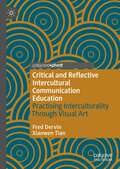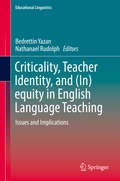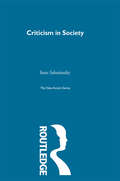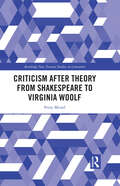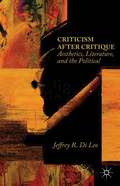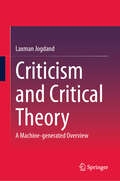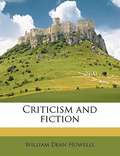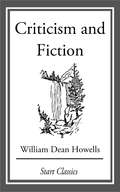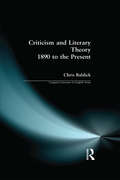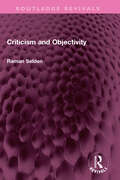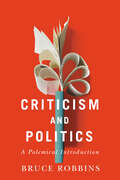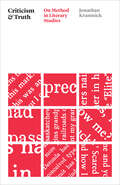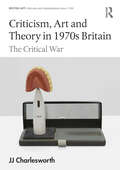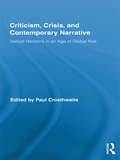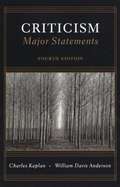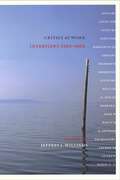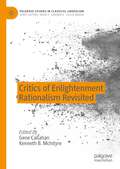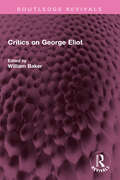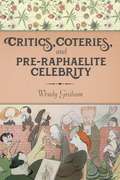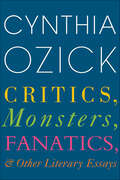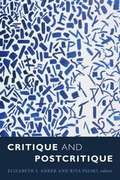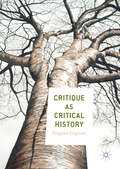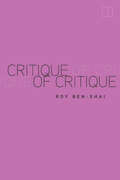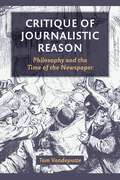- Table View
- List View
Critical and Reflective Intercultural Communication Education: Practicing Interculturality Through Visual Art
by Fred Dervin Xiaowen TianThis book provides answers to the following questions: How could visual art support us in reflecting about interculturality critically? When we look at, engage with and experience art, what is it that we can learn, unlearn and relearn about interculturality? The book adds to the multifaceted and multidisciplinary field of intercultural communication education by urging those working on the notion of interculturality (researchers, scholars and students) to give art a place in exploring its complexities. No knowledge background about art (theory) is needed to work through the chapters. The book helps us reflect on ourselves and on our engagement with the world and with others, and learn to ask questions about these elements. The authors draw on anthropology, linguistics, philosophy and sociology to enrich their discussions of critical interculturality.
Criticality, Teacher Identity, and: Issues And Implications (Educational Linguistics #35)
by Nathanael Rudolph Bedrettin YazanThis edited volume, envisioned through a postmodern and poststructural lens, represents an effort to destabilize the normalized “assumption” in the discursive field of English language teaching (ELT) (Pennycook, 2007), critically-oriented and otherwise, that identity, experience, privilege-marginalization, (in)equity, and interaction, can and should be apprehended and attended to via categories embedded within binaries (e.g., NS/NNS; NEST/NNEST). The volume provides space for authors and readers alike to explore fluidly critical-practical approaches to identity, experience, (in)equity, and interaction envisioned through and beyond binaries, and to examine the implications such approaches hold for attending to the contextual complexity of identity and interaction, in and beyond the classroom. The volume additionally serves to prompt criticality in ELT towards reflexivity, conceptual clarity and congruence, and dialogue.
Criticism & Society
by Imre SalusinszkyFirst Published in 2002. Routledge is an imprint of Taylor & Francis, an informa company.
Criticism After Theory from Shakespeare to Virginia Woolf (Routledge New Textual Studies in Literature #1)
by Perry MeiselThe argument of this book is a simple one: that criticism after theory is a single movement of thought defined by synthesis and continuity rather than by conflict and change. The most influential figures in criticism since Saussure—Bakhtin, Derrida, and Foucault—are wholly consistent with Saussure's foundational Course in General Linguistics (1916) no matter the traditions of complaint that have followed in Saussure's wake from Bakhtin forward. These complaints vitiate—despite themselves and often hilariously so—the misconceptions that have made cottage industries out of quarrels with Saussurean semiology that are based on notions of Saussure that are incorrect. The materialist criticism dominant today is actually dependent upon on the legacy of a presumably formalist structuralism rather than a step beyond it. New Historicism, postcolonialism, gender studies, environmental criticism, archive studies, even shared and surface reading are, like deconstruction, the by-products of Saussure's structuralism, not its foils. Saussure's sign is sensory and concrete. Language and materiality are not distinct but one and the same—history, society, the psychological subject, even the environment are systems of signs, material archives read and reread by futures that produce the past after the fact. Without Saussure, contemporary criticism would have no identifiable or effective source. The book begins with chapters on Saussure and Derrida, Bakhtin and Shakespeare, and Freud and Foucault followed by chapters on Victorian and American fiction, D.H. Lawrence and modern poetry, Virginia Woolf and Melanie Klein, and the historicist tropology of psychoanalysis. It concludes with a coda in life writing on the author's epileptic disability.
Criticism after Critique: Aesthetics, Literature, and the Political
by Jeffrey R. Di LeoPresenting different ways to imagine criticism without critique, this collection provides a survey of both the difficult times facing ideological critique and the ways in which literary criticism and aesthetics have been affected by changing attitudes toward critique.
Criticism and Critical Theory: A Machine-generated Overview
by Laxman JogdandThis volume offers a concise yet comprehensive machine-generated literature review of the multifaceted landscape of literary theory, encompassing formalism, structuralism, modernism, postmodernism, psychoanalytic criticism, feminism, marxism, ecocriticism, multiculturalism, and techno-criticism. The content is organized by the book editor with a human-written introduction to each chapter. It provides vital findings and discussions into reliable reference-rich summaries of literary studies. It comprises the fundamental studies in humanities, ‘criticism’ and ‘critical’ theory to provide the readers with countless possibilities for further research in general and a thorough understanding of scientific analysis of the texts and theories. Its scope extends beyond mere exploration of literary and practical criticism.
Criticism and Fiction
by William Dean HowellsWilliam Dean Howells (1837-1920) was an American realist author and literary critic. He wrote his first novel, Their Wedding Journey, in 1871, but his literary reputation really took off with the realist novel A Modern Instance, published in 1882, which describes the decay of a marriage. His 1885 novel The Rise of Silas Lapham is perhaps his best known, describing the rise and fall of an American entrepreneur in the paint business. His social views were also strongly reflected in the novels Annie Kilburn (1888) and A Hazard of New Fortunes (1890). While known primarily as a novelist, his short story "Editha" (1905) - included in the collection Between the Dark and the Daylight (1907) - appears in many anthologies of American literature. Howells also wrote plays, criticism, and essays about contemporary literary figures such as Ibsen, Zola, Verga, and, especially, Tolstoy, which helped establish their reputations in the United States. He also wrote critically in support of many American writers. It is perhaps in this role that he had his greatest influence.
Criticism and Literary Theory 1890 to the Present (Longman Literature In English Series)
by Chris BaldickPresents a coherent and accessible historical account of the major phases of British and American Twentieth-century criticism, from 'decadent' aestheticism to feminist, decontsructonist and post-colonial theories. Special attention is given to new perspectives on Shakesperean criticism, theories of the novel and models of the literary canon. The book will help to define and account for the major developments in literary criticism during this century exploring the full diversity of critical work from major critics such as T S Eliot and F R Leavis to minor but fascinating figures and critical schools. Unlike most guides to modern literary theory, its focus is firmly on developments within the English speaking world.
Criticism and Objectivity (Routledge Revivals)
by Raman SeldenFirst published in 1984 Criticism and Objectivity argues that literary critics should not abandon the concept of knowledge. English literary criticism has long considered ‘theory’ to be alien to the felt experience of readers and writers; the Romantic attitude towards reason and feeling has continued to inhibit the conceptual development of criticism. The similarities between the role of theory in science and in literary criticism imply the need for ‘objectivity’ to be redefined rather than abandoned. While accepting that tests are relatively open structures defying final interpretations, Dr Selden argues that their plurality is as much the effect of historical conditions as of the nature of language or subjectivity. He calls for an historical criticism capable of ‘conducting’ the voices of the text without resorting to formalism or reducing the text to its ‘background’. This book will be of interest to students of literary theory.
Criticism and Politics: A Polemical Introduction
by Bruce RobbinsAn accessible introduction to cultural theory and an original polemic about the purpose of criticism. What is criticism for? Over the past few decades, impassioned disagreements over that question in the academy have burst into the news media. These conflicts have renewed the culture wars over the legacy of the 1960s, becoming entangled in national politics and leading to a new set of questions about critics and the power they do or don't wield. Re-examining theorists from Matthew Arnold to Walter Benjamin, to Fredric Jameson, Stuart Hall, and Hortense Spillers, Criticism and Politics explores the animating contradictions that have long propelled literary studies: between pronouncing judgment and engaging in philosophical critique, between democracy and expertise, between political commitment and aesthetic autonomy. Both a leftist critic and a critic of the left, Robbins unflinchingly defends criticism from those who might wish to de-politicize it, arguing that working for change is not optional for critics, but rather a core part of their job description.
Criticism and Truth: On Method in Literary Studies (Thinking Literature)
by Jonathan KramnickA defense and celebration of the discipline of literary studies and its most distinctive practice—close reading. Does literary criticism offer truths about the world? In Criticism and Truth, Jonathan Kramnick offers a new and surprising account of criticism’s power by zeroing in on its singular method: close reading. Long recognized as the distinctive technique of literary studies, close reading is the critic’s way of pursuing arguments and advancing knowledge, as well as the primary skill taught in the English major. But it is also more than that—a creative, immersive, and transformative writing practice that fosters a unique kind of engagement with the world. Drawing on the rich and varied landscape of contemporary criticism, Kramnick changes how we think about the basic tools of literary analysis, including the art of in-text quotation, summary, and other reading methods, helping us to see them as an invaluable form of humanistic expertise. Criticism and Truth is a call to arms, making a powerful case for the necessity of both literature and criticism within a multidisciplinary university. As the humanities fight for survival in contemporary higher education, the study of literature doesn’t need more plans for reform. Rather, it needs a defense of the work already being done and an account of why it should flourish. This is what Criticism and Truth offers, in vivid and portable form.
Criticism and the Growth of Knowledge
by Imre Lakatos Alan MusgraveTwo books have been particularly influential in contemporary philosophy of science: Karl R. Popper's Logic of Scientific Discovery, and Thomas S. Kuhn's Structure of Scientific Revolutions. Both agree upon the importance of revolutions in science, but differ about the role of criticism in science's revolutionary growth. This volume arose out of a symposium on Kuhn's work, with Popper in the chair, at an international colloquium held in London in 1965. The book begins with Kuhn's statement of his position followed by seven essays offering criticism and analysis, and finally by Kuhn's reply. The book will interest senior undergraduates and graduate students of the philosophy and history of science, as well as professional philosophers, philosophically inclined scientists, and some psychologists and sociologists.
Criticism, Art and Theory in 1970s Britain: The Critical War (ISSN)
by JJ CharlesworthA critical study of the life of art criticism in the 1970s, this volume traces the evolution of art and art criticism in a pivotal period in post-war British history.JJ Charlesworth explores how art critics and the art press attempted to negotiate new developments in art, faced with the challenges of conceptualism, alternative media, new social movements and radical innovations in philosophy and theory. This is the first comprehensive study of the art press and art criticism in Britain during this pivotal period, seen through the lens of its art press, charting the arguments and ideas that would come to shape contemporary art as we know it today.This book will be of interest to scholars working in art history, British cultural history and history of journalism.
Criticism, Crisis, and Contemporary Narrative: Textual Horizons in an Age of Global Risk (Routledge Studies in Contemporary Literature)
by Paul CrosthwaiteThe etymological affinity between ‘criticism’ and ‘crisis’ has never been more resonant than it is today, when social life is increasingly understood as defined by a succession of overlapping global crises: financial and economic crises; environmental crises; geopolitical crises; terrorist crises; public health crises. But what is the role of literary and cultural criticism in conceptualizing this atmosphere of perpetual crisis? If, as Paul de Man maintained, criticism necessarily exists in a state of crisis, in what ways is this condition intensified at a time when the social formations within which criticism operates and the cultural artefacts that it takes as its objects are themselves pervaded by actual and imagined states of emergency? This book, the first sustained response to these questions, demonstrates the capacity of critical thought, working in dialogue with key narrative texts, to provide penetrating insights into a contemporary landscape of global, manufactured risk. Written by an international team of specialist scholars, the essays in the collection draw on a wide variety of contemporary theoretical, fictional, and cinematic sources, ranging from Giorgio Agamben, Jacques Derrida, and Fredric Jameson to Cormac McCarthy, Ian McEwan, and Lauren Beukes to Ghost and the James Bond and National Treasure series. Appearing in the midst of a phase of extraordinary turbulence in the fabric of our interconnected and interdependent world, the book makes a landmark intervention in debates concerning the cultural ramifications of globalization.
Criticism: Major Statements (4th edition)
by Charles Kaplan William Davis AndersonThis anthology encompasses the historic sweep of literary criticism from Plato to the present in a compact format.
Critics at Work: Interviews 1993-2003 (Cultural Front)
by Jeffrey J. WilliamsFeaturing interviews with nineteen leading U.S. literary and cultural critics, Critics at Work offers a unique picture of recent developments in literary studies, critical theory, American studies, gay and lesbian studies, philosophy, and other fields. It provides informative, timely, and often provocative commentary on a broad range of topics, from the state of theory today and the prospects for cultural studies to the role of public intellectuals and the place of political activism. These conversations also elicit illuminating and sometimes surprising insights into the personal and professional lives of its contributors. Individually, each interview gives a significant overview of a critic's work. Taken together, they provide an assessment of literary and cultural studies from the establishment of theory and its diffusion, in recent years, into various cultural and identity studies. In addition to the interviews themselves, the volume includes useful short introductions to each critic's work and biography. Interviewees: K. Anthony Appiah, Lauren Berlant, Cathy Davidson, Morris Dickstein, Stanley Fish, Barbara Foley, Nancy Fraser, Gerald Graff, Alice Kaplan, E. Ann Kaplan, Robin D.G. Kelley, Paul Lauter, Louis Menand, Richard Ohmann, Andrew Ross, Eve Kosofsky Sedgwick, Jane Tompkins, Marianna Torgovnick, and Alan Wald.
Critics of Enlightenment Rationalism Revisited (Palgrave Studies in Classical Liberalism)
by Gene Callahan Kenneth B. McIntyreThis book provides an overview of some of the most important critics of “Enlightenment rationalism.” The subjects of the volume (including, among others, Pascal, Vico, Schmitt, Weber, Anscombe, Scruton, and Tolkien) do not share a philosophical tradition as much as a skeptical disposition toward the notion, common among modern thinkers, that there is only one standard of rationality or reasonableness, and that that one standard is or ought to be taken from the presuppositions, methods, and logic of the natural sciences. The essays on each thinker are intended not merely to offer a commentary on that thinker, but also to place the person in the context of this larger stream of anti-rationalist thought.
Critics on George Eliot (Routledge Revivals)
by William BakerFirst published in 1973 Critics on George Eliot brings together a selection of the best critical essays and discussions on the novels of George Eliot, including many that are not easily available outside well established and comprehensive libraries. The selection covers the whole range of George Eliot’s work, and by setting different critical points of view side by side helps the student to find a position of her own. The intention is not to limit the student’s critical reading to one small volume, but to stimulate to explore the critics more widely for herself and to read the novels again with greater understanding, and pleasure. This is a must read for students of English literature.
Critics, Coteries, and Pre-Raphaelite Celebrity (Gender and Culture Series)
by Wendy GrahamFounded by a band of young iconoclasts, the Pre-Raphaelite Brotherhood stunned Victorian England with its revaluation of culture and lifestyle. With Pre-Raphaelitism ascendant in the 1850s and canonical by the 1880s, the movement’s refractory reception history is an object lesson in how avant-gardes burst upon the scene, dispense with their antagonistic posture, and become a mainstay of tradition. Wendy Graham traces the critical discourses that greeted the Pre-Raphaelites’ debut, shaped their contemporary reception, and continued to inform responses to them well after their heyday. She explains the mechanics of fame and the politics of scandal contributing to the rise of aestheticism, providing a new interpretation of the place of aesthetic counterculture in Victorian England.Critics, Coteries, and Pre-Raphaelite Celebrity sheds new light on Victorian discourses on sexuality and masculinity through a thick description of literary bravado, the emotions of male bonding within cliques, and homoerotic frissons among the creators and reviewers of Pre-Raphaelitism. Graham threads together the qualities that made William Holman Hunt, John Everett Millais, and Gabriel Rossetti exemplary figures of aesthetic celebrity in the 1850s; Algernon Swinburne and Simeon Solomon in the 1860s; and Edward Burne-Jones and Walter Pater in the 1870s. The book documents the symbiotic relationship between periodical writers and the artists and poets they helped make famous, demonstrating that the origin myth of Bohemian artistic transcendence was connected with the rise of a professional class of journalists. Graham shows that the Pre-Raphaelites innovated many of the phenomena now associated with Oscar Wilde, arguing that they were foundational for him in forging an artistic and personal identity with a full-blown publicity apparatus. Wilde had models. This book is about them.
Critics, Monsters, Fanatics, & Other Literary Essays
by Cynthia OzickIn a collection that includes new essays written explicitly for this volume, one of our sharpest and most influential critics confronts the past, present, and future of literary culture. If every outlet for book criticism suddenly disappeared — if all we had were reviews that treated books like any other commodity — could the novel survive? In a gauntlet-throwing essay at the start of this brilliant assemblage, Cynthia Ozick stakes the claim that, just as surely as critics require a steady supply of new fiction, novelists need great critics to build a vibrant community on the foundation of literary history. For decades, Ozick herself has been one of our great critics, as these essays so clearly display. She offers models of critical analysis of writers from the mid-twentieth century to today, from Saul Bellow, Bernard Malamud, and Kafka, to William Gass and Martin Amis, all assembled in provocatively named groups: Fanatics, Monsters, Figures, and others. Uncompromising and brimming with insight, these essays are essential reading for anyone facing the future of literature in the digital age.
Critique and Postcritique
by Rita Felski Elizabeth S. AnkerNow that literary critique's intellectual and political pay-off is no longer quite so self-evident, critics are vigorously debating the functions and futures of critique. The contributors to Critique and Postcritique join this conversation, evaluating critique's structural, methodological, and political potentials and limitations. Following the interventions made by Bruno Latour, Eve Kosofsky Sedgwick, Sharon Marcus and Stephen Best, and others, the contributors assess the merits of the postcritical turn while exploring a range of alternate methods and critical orientations. Among other topics, the contributors challenge the distinction between surface and deep reading; outline how critique-based theory has shaped the development of the novel; examine Donna Haraway's feminist epistemology and objectivity; advocate for a "hopeful" critical disposition; highlight the difference between reading as method and critique as genre; and question critique's efficacy at attending to the affective dimensions of experience. In these and other essays this volume outlines the state of contemporary literary criticism while pointing to new ways of conducting scholarship that are better suited to the intellectual and political challenges of the present. Contributors: Elizabeth S. Anker, Christopher Castiglia, Russ Castronovo, Simon During, Rita Felski, Jennifer L. Fleissner, Eric Hayot, Heather Love, John Michael, Toril Moi, Ellen Rooney, C. Namwali Serpell
Critique as Critical History
by Bregham DalglieshThis book presents the first sustained articulation of a Foucauldian oeuvre. It situates Foucault's critique within the tradition of Kant's call for a philosophical archaeology of reason; in parallel, it demonstrates the priority in Foucault's thought of Nietzsche over Heidegger and the framing of reason against an ontology of power. Bregham Dalgliesh hereby claims that at the heart of the Foucauldian oeuvre is the philosophical method of critical history. Its task is to make the will to know that drives thought conscious of itself as a problem, especially the regimes of truth that define our governmentalities. By revealing the contingency of their constituent parts of knowledge, power and ethics, Dalgliesh demonstrates that critical history offers an alternative mode of critique to the hithertofore singular reading of the intellectual heritage of enlightenment, while it fosters an agonistic concept of freedom in respect of our putatively necessary limits.
Critique of Critique (Square One: First-Order Questions in the Humanities)
by Roy Ben-ShaiWhat is critique? How is it used and abused? At a moment when popular discourse is saturated with voices confronting each other about not being critical enough, while academic discourses proclaim to have moved past critique, this provocative book reawakens the foundational question of what 'critique' is in the first place. Roy Ben-Shai inspects critique as an orientation of critical thinking, probing its structures and assumptions, its limits and its risks, its history and its possibilities. The book is a journey through a landscape of ideas, images, and texts from diverse sources—theological, psychological, etymological, and artistic, but mainly across the history of philosophy, from Plato and Saint Augustine, through Kant and Hegel, Marx and Heidegger, up to contemporary critical theory. Along the way, Ben-Shai invites the reader to examine their own orientation of thought, even at the moment of reading the book; to question popular discourse; and to revisit the philosophical canon, revealing affinities among often antagonistic traditions, such as Catholicism and Marxism. Most importantly, Critique of Critique sets the ground for an examination of alternative orientations of critical thinking, other ways of inhabiting and grasping the world.
Critique of Journalistic Reason: Philosophy and the Time of the Newspaper
by Tom VandeputteAn encounter between philosophy and journalism recurs across the modern philosophical tradition. Images of reporters and newspaper readers, messengers and town criers, announcements and rumors populate the work of such thinkers as Kierkegaard, Nietzsche, and Benjamin. This book argues that these three thinkers’ preoccupation with journalism cannot be separated from their philosophy “proper” but plays a pivotal role in their philosophical work, where it marks an important nexus between their theories of history, time, and language. Journalism, in the tradition Vandeputte brings to light, figures before anything else as a cipher of the time in which philosophy is written. If the journalist and newspaper reader characterize what Kierkegaard calls “the present age,” that is because they exemplify a present marked by the crisis of the philosophy of history—a time after the demise of history as a philosophizable concept. In different ways, the pages of the newspaper appear in the European philosophical tradition as a site where teleological and totalizing representations of history must founder, together with the conceptions of progress and development that sustain them.But journalism does not simply mark the end of philosophy; for Kierkegaard, Nietzsche, and Benjamin, journalistic writing also takes on an exemplary role in the attempt to think time and history in the wake of this demise. The concepts around which these attempts crystallize—Kierkegaard’s “instant,” Nietzsche’s “untimeliness,” and Benjamin’s “actuality”—all emerge from the philosophical confrontation with journalism and its characteristic temporalities.
